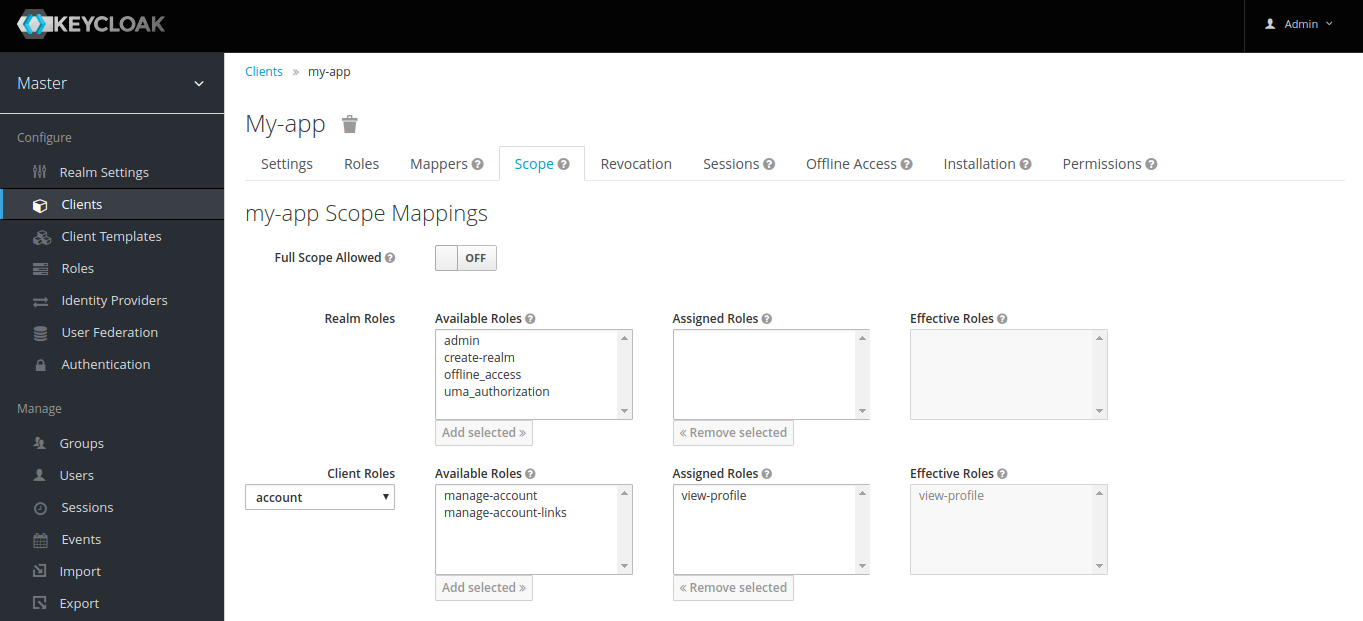Easy Keycloak setup for Angular applications.
This library helps you to use keycloak-js in Angular > v4.3 applications providing the following features:
- A Keycloak Service which wraps the keycloak-js methods to be used in Angular, giving extra functionalities to the original functions and adding new methods to make it easier to be consumed by Angular applications.
- Generic AuthGuard implementation, so you can customize your own AuthGuard logic inheriting the authentication logic and the roles load.
- A HttpClient interceptor that adds the authorization header to all HttpClient requests. It is also possible to disable this interceptor or exclude routes from having the authorization header.
- This documentation also assists you to configure the keycloak in the Angular applications and with the client setup in the admin console of your keycloak installation.
This library depends on angular and keycloak versions so as it might exist breaking changes in some of them there are different build versions supporting these combinations, so be aware to choose the correct version for your project.
| keycloak-angular | Angular | Keycloak | SSO-RH |
|---|---|---|---|
| 1.3.x | 4 and 5 | 3 | 7 |
| 2.x.x | 4 and 5 | 4 | - |
| 3.x.x | 6 | 3 | 7 |
| 4.x.x | 6 | 4 | - |
| 5.x.x | 7 | 3 | 7 |
| 6.x.x | 7 | 4 | - |
Warning: This library will work only with versions higher or equal than 4.3.0 of Angular. The reason for this is that keycloak-angular uses the Interceptor from @angular/common/http package and this feature was available from this version on.
Please, again, be aware to choose the correct version, as stated above. Installing this package without a version will make it compatible with the latest angular and keycloak versions.
In your angular application directory:
With npm:
npm install --save keycloak-angular@<choosen-version-from-table-above>With yarn:
yarn add keycloak-angular@<choosen-version-from-table-above>The KeycloakService should be initialized during the application loading, using the APP_INITIALIZER token.
import { NgModule, APP_INITIALIZER } from '@angular/core';
import { KeycloakService, KeycloakAngularModule } from 'keycloak-angular';
import { initializer } from './utils/app-init';
@NgModule({
imports: [KeycloakAngularModule],
providers: [
{
provide: APP_INITIALIZER,
useFactory: initializer,
multi: true,
deps: [KeycloakService]
}
]
})
export class AppModule {}- Notice that the KeycloakAngularModule was imported by the AppModule. For this reason you don't need to insert the KeycloakService in the AppModule providers array.
This function can be named and placed in the way you think is most appropriate. In the
underneath example it was placed in a separate file app-init.ts and the function was called
initializer.
import { KeycloakService } from 'keycloak-angular';
export function initializer(keycloak: KeycloakService): () => Promise<any> {
return (): Promise<any> => keycloak.init();
}Besides configuring the keycloak lib in your application it is also necessary to setup the access - scope for the account client.
In this documentation we assume that you already installed and configured your Keycloak instance, as well created the client app.
Hint: If you need to create an environment for testing purposes, try out the Keycloak demo or the official keycloak docker image.
When requesting the method to get the User's Profile, the client app should have the scope and access to the account view-profile role. To do it, access Clients ➡️ My-app ➡️ Scope. Select the account app in Client Roles and assign the view-profile role.
A generic AuthGuard, KeycloakAuthGuard, was created to help you bootstrap your security configuration and avoid duplicate code. This class already checks if the user is logged in and get the list of roles from the authenticated user, provided by the keycloak instance. In your implementation you just need to implement the desired security logic.
Example:
import { Injectable } from '@angular/core';
import { CanActivate, Router, ActivatedRouteSnapshot, RouterStateSnapshot } from '@angular/router';
import { KeycloakService, KeycloakAuthGuard } from 'keycloak-angular';
@Injectable()
export class AppAuthGuard extends KeycloakAuthGuard {
constructor(protected router: Router, protected keycloakAngular: KeycloakService) {
super(router, keycloakAngular);
}
isAccessAllowed(route: ActivatedRouteSnapshot, state: RouterStateSnapshot): Promise<boolean> {
return new Promise((resolve, reject) => {
if (!this.authenticated) {
this.keycloakAngular.login();
return;
}
const requiredRoles = route.data.roles;
if (!requiredRoles || requiredRoles.length === 0) {
return resolve(true);
} else {
if (!this.roles || this.roles.length === 0) {
resolve(false);
}
let granted: boolean = false;
for (const requiredRole of requiredRoles) {
if (this.roles.indexOf(requiredRole) > -1) {
granted = true;
break;
}
}
resolve(granted);
}
});
}
}By default all HttpClient requests will add the Authorization header in the format of: Authorization: Bearer TOKEN.
There is also the possibility to exclude a list of URLs that should not have the authorization header. The excluded list must be informed in the keycloak initialization. For example:
try {
await keycloak.init({
config: {
url: 'http://localhost:8080/auth',
realm: 'your-realm',
clientId: 'client-id'
},
initOptions: {
onLoad: 'login-required',
checkLoginIframe: false
},
enableBearerInterceptor: true,
bearerExcludedUrls: ['/assets', '/clients/public']
});
resolve();
} catch (error) {}Mauricio Gemelli Vigolo |
Frederik Prijck |
jmparra |
Marcel Német |
Raphael Alex Silva Abreu |
|---|
If you want to contribute to the project, please check out the contributing document.
keycloak-angular is licensed under the MIT.
keycloak-js is licensed under the Apache 2.0.



